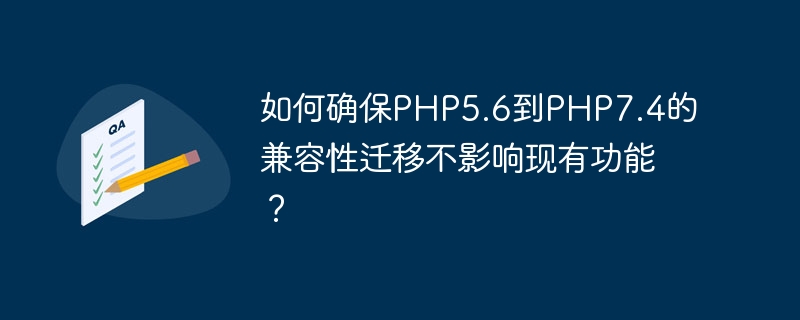

How to ensure that the compatibility migration from PHP5.6 to PHP7.4 does not affect existing functions?
With the update iteration of PHP, the changes from PHP5.6 to PHP7.4 are huge. These changes include syntax updates, performance improvements, and deprecation of some features. When migrating PHP versions, we must ensure that existing functions can run normally in the new version and will not cause potential problems. This article will introduce some tips and strategies to help you ensure that your PHP5.6 to PHP7.4 compatibility migration goes smoothly.
First, we need to determine the scope of code that needs to be migrated. Some projects may require only part of the code to be migrated, while other projects may require all of the code to be migrated. After determining the migration scope, we need to clarify the target version to migrate to, here is PHP7.4.
Before migrating, we need to fully test existing features to ensure they run properly in the current environment. This includes running all unit and integration tests and checking existing functionality for stability and correctness. Only when the existing functions are stable can subsequent migration work be carried out.
PHP provides some compatibility detection tools that can help us analyze problems that may be caused by the code in the new version. For example, in PHP7.4, the function mysql_connect() has been deprecated. We can use tools such as PHP_CodeSniffer to scan the project code and detect whether the deprecated function is used. These tools can help us quickly locate potential problems and provide solutions.
For large projects, we recommend gradual migration. Break the migration scope into small chunks and migrate and test them one by one. This reduces the risk of migration and allows development teams to better adapt to new version features and syntax. At the same time, gradual migration can also avoid a large number of errors at one time during the migration process, making it easier to troubleshoot and repair.
For example, we can start migrating simple functions first, such as modifying the calling method of functions, replacing obsolete functions, etc. Then, gradually carry out more complex migration work, such as modifying classes, namespaces, etc. After each migration phase, the entire system needs to be fully tested to ensure that no new issues have been introduced.
PHP7 brings many performance and syntax improvements. We can use these new features to improve the quality and efficiency of the code. For example, PHP7 introduces return value type declaration. We can provide more rigorous code inspection and clearer documentation by specifying the return type of the function.
The following is a simple example showing how to use PHP7's function return value type declaration:
function sum(int $a, int $b): int {
return $a + $b;
}
$result = sum(3, 4); // 返回类型为intDuring the migration process, we also need to ensure that the third-party libraries and extensions we rely on are compatible with PHP7.4. This includes checking their latest versions and documentation to see if they have been updated to adapt to the new features and syntax of PHP 7.4. If any dependent libraries are incompatible, we need to update or replace them to ensure the stability and compatibility of the entire system.
To sum up, to ensure that the compatibility migration from PHP5.6 to PHP7.4 does not affect existing functions, we need to fully test the existing functions in advance, use compatibility detection tools, gradually migrate, take advantage of new features and Update dependent third-party libraries and extensions. Through reasonable migration strategies and strict code testing, potential problems can be discovered and solved in time during the migration process, ensuring a smooth transition of the system in the new version.
The above is the detailed content of How to ensure that the compatibility migration from PHP5.6 to PHP7.4 does not affect existing functions?. For more information, please follow other related articles on the PHP Chinese website!




